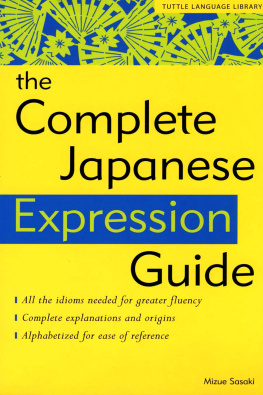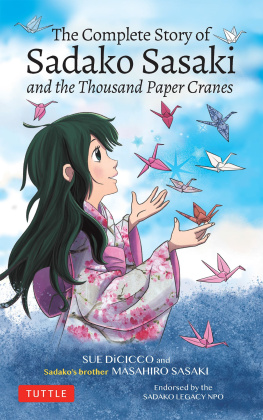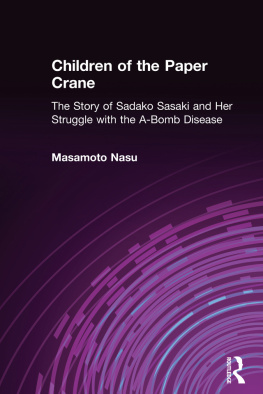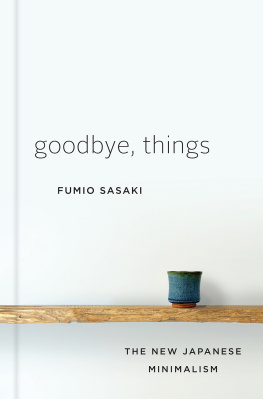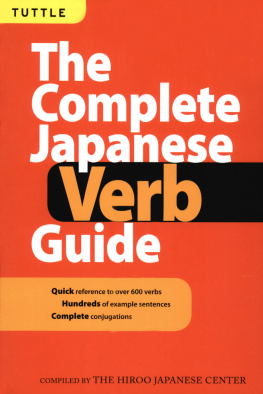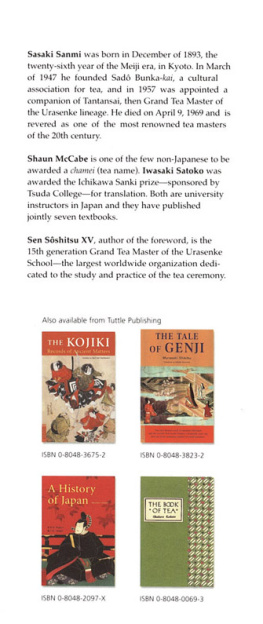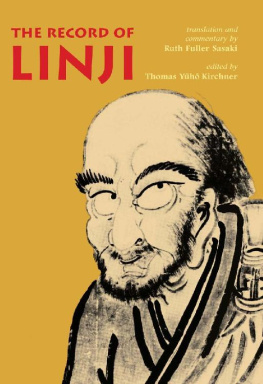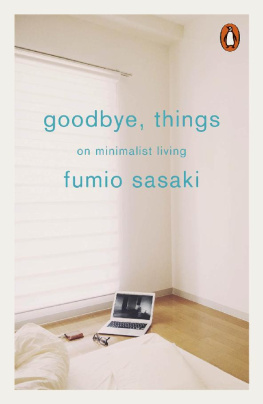Mizue Sasaki - Complete Japanese Expression Guide
Here you can read online Mizue Sasaki - Complete Japanese Expression Guide full text of the book (entire story) in english for free. Download pdf and epub, get meaning, cover and reviews about this ebook. publisher: Tuttle Publishing, genre: Romance novel. Description of the work, (preface) as well as reviews are available. Best literature library LitArk.com created for fans of good reading and offers a wide selection of genres:
Romance novel
Science fiction
Adventure
Detective
Science
History
Home and family
Prose
Art
Politics
Computer
Non-fiction
Religion
Business
Children
Humor
Choose a favorite category and find really read worthwhile books. Enjoy immersion in the world of imagination, feel the emotions of the characters or learn something new for yourself, make an fascinating discovery.
- Book:Complete Japanese Expression Guide
- Author:
- Publisher:Tuttle Publishing
- Genre:
- Rating:3 / 5
- Favourites:Add to favourites
- Your mark:
- 60
- 1
- 2
- 3
- 4
- 5
Complete Japanese Expression Guide: summary, description and annotation
We offer to read an annotation, description, summary or preface (depends on what the author of the book "Complete Japanese Expression Guide" wrote himself). If you haven't found the necessary information about the book — write in the comments, we will try to find it.
Complete Japanese Expression Guide — read online for free the complete book (whole text) full work
Below is the text of the book, divided by pages. System saving the place of the last page read, allows you to conveniently read the book "Complete Japanese Expression Guide" online for free, without having to search again every time where you left off. Put a bookmark, and you can go to the page where you finished reading at any time.
Font size:
Interval:
Bookmark:
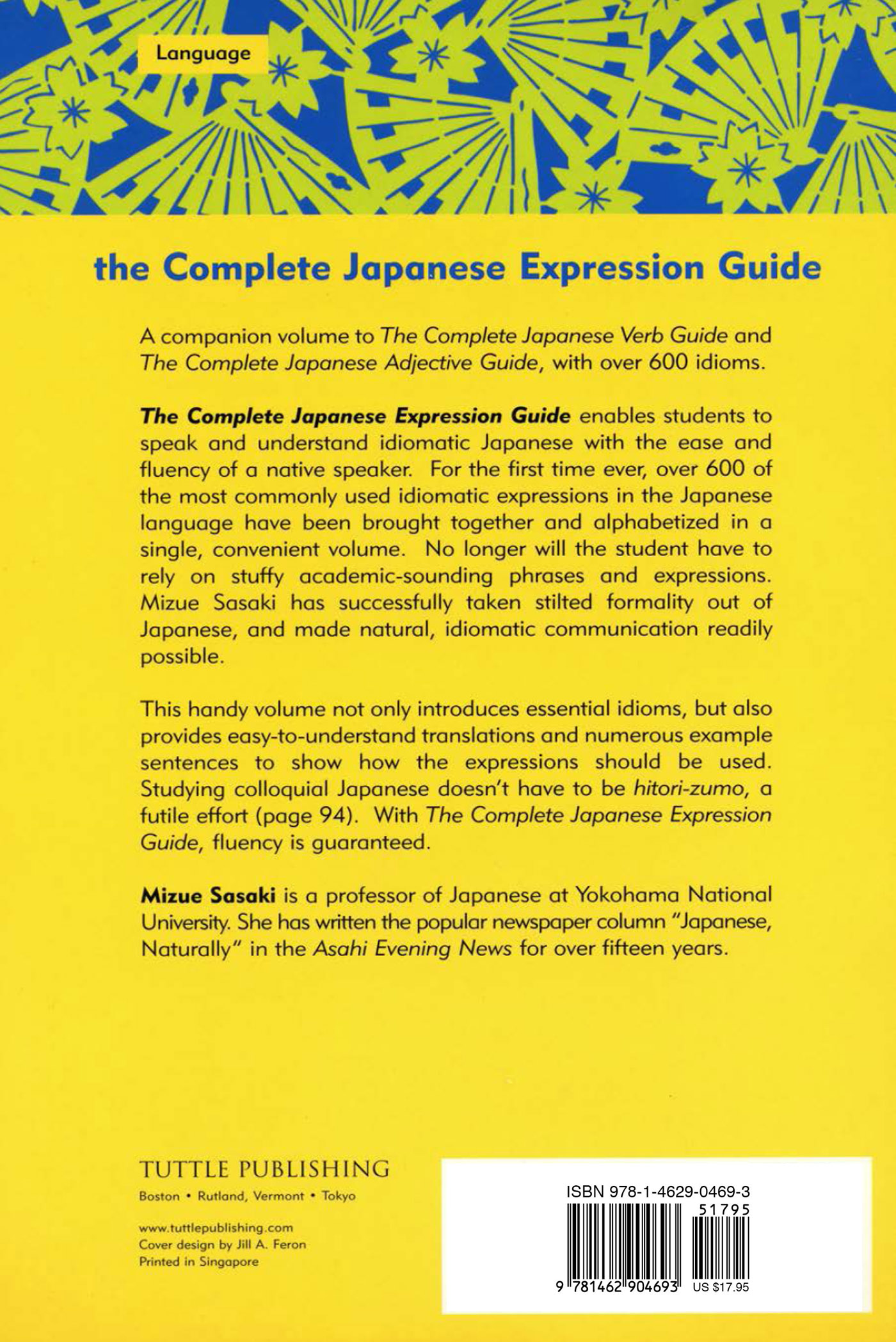
JAPANESE
EXPRESSIONS
abura o shiboru
 reprimand, reproach
reprimand, reproach  TOMODACHI 1: D shimashita ka? TOMODACHI 2: Kaisha no kuruma o butsukete, buch ni abura o shiboraremashita yo. FRIEND 1: What's the matter? FRIEND 2: I had an accident with the company car and the department chief really gave me hell.
TOMODACHI 1: D shimashita ka? TOMODACHI 2: Kaisha no kuruma o butsukete, buch ni abura o shiboraremashita yo. FRIEND 1: What's the matter? FRIEND 2: I had an accident with the company car and the department chief really gave me hell.Abura o shiboru, literally "to squeeze out oil," means to severely reproach a person. When extracting oil from sesame seeds, rapeseeds, or soybeans, they are crushed, squeezed, and thoroughly pulverized. This process is similar to that of severely scolding someone. EXAMPLES Shukudai o wasurete, sensei ni abura o shiborareta.
I forgot my homework and was chewed out by the teacher. Kare wa saikin, namakete iru node, sukoshi abura o shibotte oko.
Lately he's become lazy, so let's have a little talk with him.
Kaigi de okashi na hatsugen o shite, buch ni abura o shiborareta.
The department chief gave me a sound scolding because I said something out-of-line in the meeting. Anata ga sensei ni abura o shiborareru no wa atarimae da.
The teacher has good reason to rake you over the coals. Suzuki Sensei, uchi no kodomo, sukoshi abura o shibotte yatte kudasai.
Professor Suzuki, please give our child a bit of a talking-to.
abura o uru idle away one's time
idle away one's time  SENPAI: Kaeri ga osokatta ne. Doko de abura o utte itan' da? KHAI: Abura nanka utte imasen. Chanto shigoto o shite imashita yo.
SENPAI: Kaeri ga osokatta ne. Doko de abura o utte itan' da? KHAI: Abura nanka utte imasen. Chanto shigoto o shite imashita yo.
SENIOR: You're late getting back. Where were you loafing off? JUNIOR: I wasn't loafing off! I've been busy working.
Abura o uru means either to pass the time by engaging in idle talk or to waste time while at work or while attending to something. During the Edo period, people bought lantern oil from wandering merchants. When the oil containers became low, the oil would become viscous and thus took longer to pour. When this happened, the merchants would engage the housewives in light conversation. From this came the meaning of idling away one's time.
EXAMPLES Doko de abura o utte ita no desu ka?
Where have you been loafing? Konna tokoro de abura o utte inaide, shigoto o shinasai.
Stop shooting the breezehere, of all placesand get back to work! Kare wa doko de abura o utte iru no ka, mada kaeranai.
He's still not back. Where can he be loafing off? Anata ni wa, watashi ga abura o utte iru y ni mierun' desu ka?
Does it look to you as if I'm loafing off? Kanojo wa shigoto-chu ni muda-banashi o shite, abura bakari utte iru.
She does nothing but gossip at work.
ago de tsukau  boss around
boss around  OTTO: Oi, soko no shinbun, totte kurenai ka? , megane mo. TSUMA: Hito no koto, ago de tsukawanaide, jibun de nasattara ii noni. HUSBAND: Hey, would you get me that newspaper over there? Oh, and my glasses too. WIFE: Instead of bossing other people around, you should do it yourself.
OTTO: Oi, soko no shinbun, totte kurenai ka? , megane mo. TSUMA: Hito no koto, ago de tsukawanaide, jibun de nasattara ii noni. HUSBAND: Hey, would you get me that newspaper over there? Oh, and my glasses too. WIFE: Instead of bossing other people around, you should do it yourself.
Ago de tsukau, literally "to use the chin," means to order someone around or to have someone at one's beck and call.
This expression comes from the way people tend to stick out their chins when ordering others to do something. Another expression using ago is ago o dasu, which means to bum oneself out. EXAMPLES Shach wa itsumo, shain o ago de tsukatte iru.
The boss is always ordering the employees around. Hito o ago de tsukaeru tachiba de wa arimasen.
You are in no position to be ordering people around. Kare ni ago de tsukawareru y de wa, o-shimai da.
It's all over once he starts ordering you around. Kare no ago de hito o tsukau taido ni wa, gaman dekinai.
I just can't put up with the way he orders people about.
Kach wa buka o ago de tsukatte iru.
The section chief orders his subordinates around relentlessly.
aiso ga tsukiru  lose patience with, lose interest in
lose patience with, lose interest in  MUSUKO: Otsan, boku, arubaito-saki, kubi ni natta yo. CHICHIOYA: Chikoku bakari shita kara da. Shach mo kitto omae ni aiso ga tsukitan ' da yo.
MUSUKO: Otsan, boku, arubaito-saki, kubi ni natta yo. CHICHIOYA: Chikoku bakari shita kara da. Shach mo kitto omae ni aiso ga tsukitan ' da yo.
SON: Dad, I've been fired from my part-time job. FATHER: It's because you were always late. You must have tried your boss's patience to the limit.
Aiso (affability) is a shortened form of aiso, and together with tsukiru (use up) implies completely losing patience or interest.
Other forms of this expression are aiso o tsukasu (be fed up), aiso o tsukasareru (be given up by someone), and aiso-zukashi (spiteful remarks). EXAMPLES Uso bakari tsuku node, kare ni wa aiso ga tsukimashita.
He's such an habitual liar. I've had it with him. Kare wa, koibito ni aiso o tsukasareta y desu yo.
It appears that his girlfriend has lost patience with him. Anna hito nara, kanojo ga aiso o tsukasu no mo tozen desu.
It's only to be expected that she'd lose interest in someone like that. Shomin o wasureta seijika ni wa, sukkari aiso ga tsukite shimatta.
I'm tired of politicians who don't care about the public.
Kanojo wa uwaki suru otto ni aiso ga tsuki, rikon suru koto ni shita.
She was fed up with her unfaithful husband, so she divorced him.
aizuchi o utsu chime in
chime in  BUCH: Kono y ni susumetai to omoun' da ga. BUKA: , sore de iin ja nai desh ka? BUCH: Sakki kara, kind wa aizuchi o utsu dake dejibun no iken o iwanai ne.
BUCH: Kono y ni susumetai to omoun' da ga. BUKA: , sore de iin ja nai desh ka? BUCH: Sakki kara, kind wa aizuchi o utsu dake dejibun no iken o iwanai ne.
DEPARTMENT CHIEF: This is the kind of direction I'd like to move in. SUBORDINATE: Yes, I guess that would be fine. DEPARTMENT CHIEF: You've just been echoing me and not giving me your own opinions on the matter.
Aizuchi o utsu, literally "a set of hammers striking," originally described when an apprentice blacksmith worked with the master and they would coordinate their hammer strokes, one striking after the other. Thus, the expression refers to tactful responses that keep a conversation moving, phrases like "I see" and "really?" EXAMPLES Kare wa hito no hanashi ni aizuchi o utte bakari iru.
All he does when you talk to him is agree with what you say.
Dshite, aizuchi bakari utsuri desu ka?
Why do you only echo what I'm saying? ? Kare ga aizuchi o uttan' desu ka?
What? You mean you actually got a response out of him? Kare ni aizuchi o utaseru to wa, kimi mo sugoi ne.
It really is impressive how you are able to get him to respond.
akaji ni naru be in the red
be in the red 
Font size:
Interval:
Bookmark:
Similar books «Complete Japanese Expression Guide»
Look at similar books to Complete Japanese Expression Guide. We have selected literature similar in name and meaning in the hope of providing readers with more options to find new, interesting, not yet read works.
Discussion, reviews of the book Complete Japanese Expression Guide and just readers' own opinions. Leave your comments, write what you think about the work, its meaning or the main characters. Specify what exactly you liked and what you didn't like, and why you think so.

